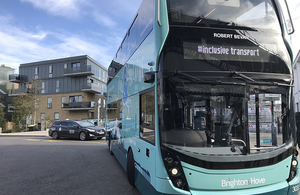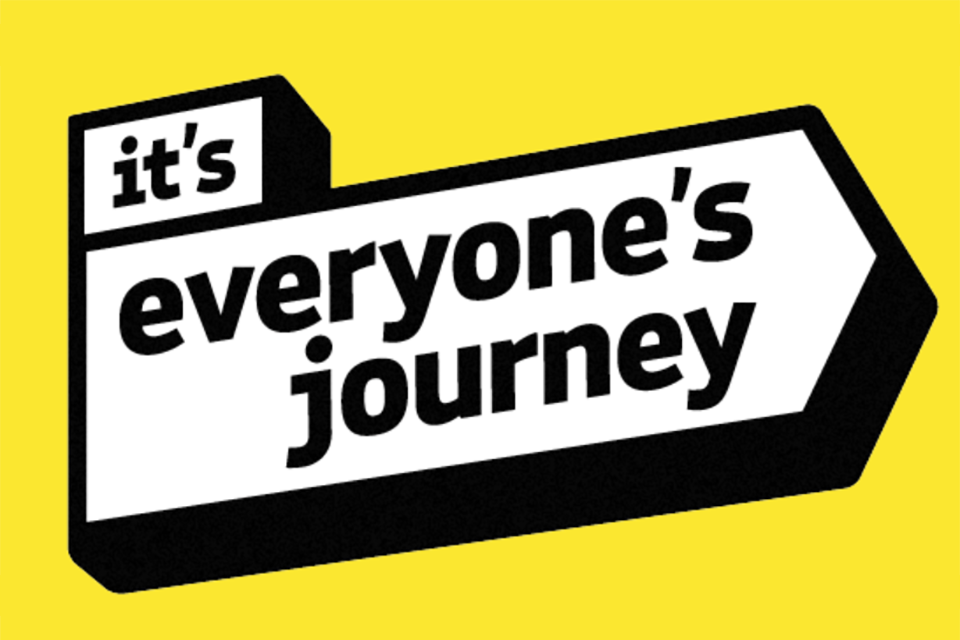Audio and visual funding for buses will make journeys accessible for all
New partnership to make buses more accessible for disabled passengers.

- £2 million to provide audio and visual equipment for buses to improve journeys for everyone including those with visual or hearing impairment
- DfT launches new communications campaign ‘It’s everyone’s journey’ to improve disabled people’s experiences on public transport
- call for partners to sign up to the campaign and join partners already supporting it including British Airways, LNER and Alzheimer’s Society
Buses around Great Britain will become more accessible for disabled passengers thanks to a new partnership with the Real Time Information Group (RTIG), announced today (29 October 2019).
The group, which supports good practice in the use of communications technology on public transport, will work with the Department for Transport to allocate £2 million of funding to small bus operators for audible and visible on-board information.
With around 50% of public transport journeys made on buses, this funding will help to ensure that passengers can board more buses with greater confidence, knowing where they are and when to get off.
It coincides with the launch of the It’s everyone’s journey campaign, the first stage of a new government-backed initiative to highlight the part we can all play in improving disabled people’s experiences when using public transport.
The department is now calling on charities, transport operators, and commercial organisations to join the campaign, helping to raise awareness of the needs of disabled travellers and share some of the improvements being made to make travel easier for the one in 5 disabled people in the UK.

Transport Secretary Grant Shapps said:
It is unacceptable that people still feel they cannot travel by bus, because of a lack of basic route and destination information on board local bus services.
This partnership is the next step in ensuring that passengers have the information they need to travel confidently on local bus services throughout Great Britain.
However, we know there is more to do which is why I’m delighted we’re also launching our It’s everyone’s journey campaign today and I invite as many partners as possible to join up so that everyone has equal access to public transport.
Accessibility Minister Nusrat Ghani said:
Transport is at the heart of how we live our lives, and I am determined that we remove any barriers faced by disabled people.
Every passenger, regardless of where they travel in Great Britain, should be able to do so confident that they have boarded the correct vehicle and are travelling to the right place.
That’s why it’s fantastic to announce this partnership with the Real Time Information Group today, and I hope this funding will help more buses meet the needs of the people who rely on them every day.
The fund for the provision of audio and visual information on-board buses was announced as part of the government’s Inclusive Transport Strategy which aims to provide equal access to the transport network by 2030.
Operators of local bus services are likely to be required to have audio and visible information systems in their vehicles, and this funding is intended to help small operators which might find this costly to implement.
With audio visual equipment only available in limited areas, and predominantly provided by larger operators, the department expects this funding to benefit up to 30 small bus operators.
Tim Rivett, General Manager at the Real Time Information Group said:
Audio visual information helps reduce barriers to travel and increases confidence in public transport for all passengers, but particularly disabled passengers.
RTIG is looking forward to working with the department to help small operators roll out audio visual information and provide the customer benefits more quickly than would otherwise happen.
In the first phase of It’s everyone’s journey, the campaign will work with partner organisations to communicate the improvements that are happening at a local and national level to make public transport more accessible and inclusive of disabled people.
It will be followed by a public advertising campaign early in 2020 that will challenge how we all use public transport and encourage everyone to reflect on how common, and often unconscious, behaviours can impact others.
This is another commitment in the Inclusive Transport Strategy and is the next in a series of improvements by the Transport Secretary to create a more accessible transport network, helping disabled people travel safely and with confidence.
Martin Harris, Brighton & Hove and Metrobus’ Managing Director, said:
We’re right behind the DfT’s strategy and we welcome it wholeheartedly. Everybody deserves to feel happy and confident while they travel. The best way to make buses more accessible is to keep listening to the experts: our passengers and our communities.
Our entire fleet (440 buses) is ‘talking buses’, where passengers can see and hear next stop and other announcements, such as diversions. We introduced them in 2016 after one of our visually impaired passengers told us she had alighted at the wrong stop several times and it was making her anxious.
A study commissioned by Department for Transport to investigate how access to transport affects the life opportunities and wellbeing of people living in England found that access to public transport has a wide-ranging positive impact on people’s lives.
The research, carried out by NatCen and the University of the West of England, published today along with 2 other studies (Transport, health and wellbeing and Transport and inequality), found public transport is important for being able to access services like healthcare, food shops and education.
The government recently announced a major package of new measures worth £220 million, which will invest in new ways to ensure more flexible public transport such as express lanes for buses, to start in the West Midlands.
The long term funding plan for the upcoming long-term bus strategy – a first for the UK – is expected at the 2020 spending review.
News desk enquiries
Media enquiries 0300 7777 878
Switchboard 0300 330 3000